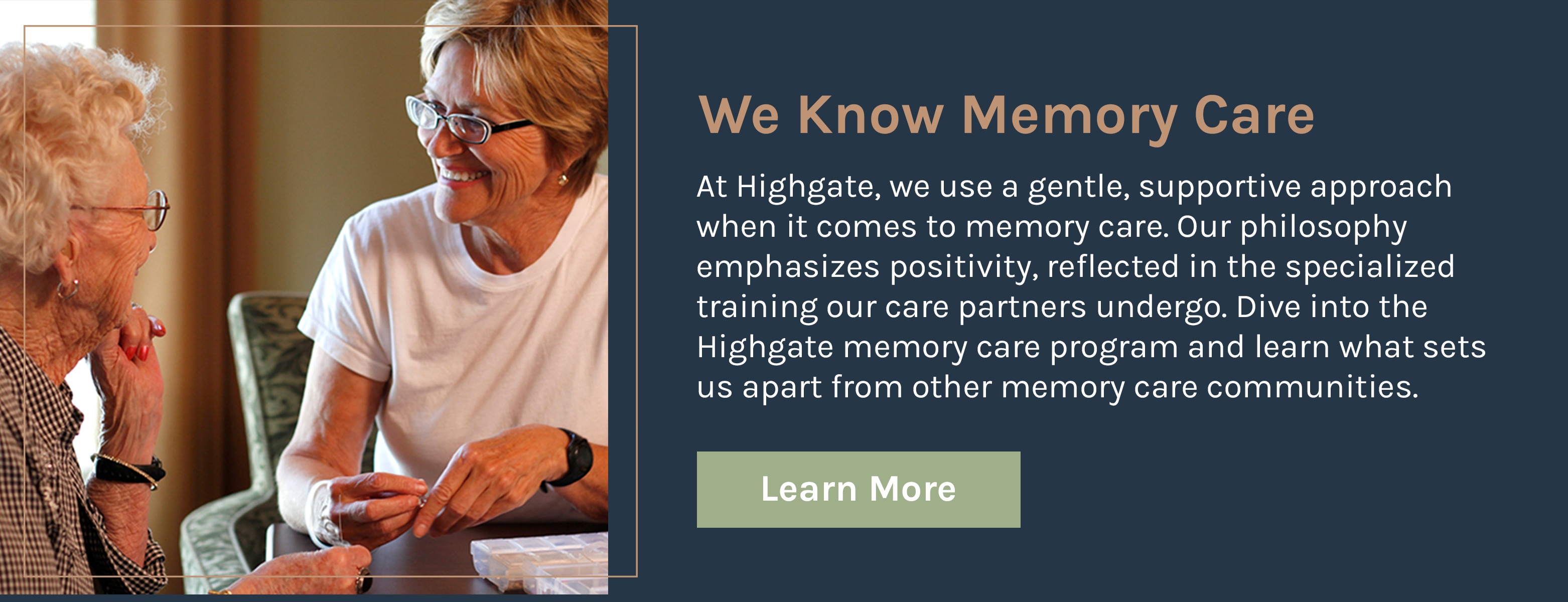
When you’re caring for a loved one with memory loss, it can feel devastating to watch your loved one change. Fortunately, there are memory care communities where your loved one can continue to live a purposeful, positive life.
What Is Memory Care?
Memory care is a special kind of care provided to those with varying degrees of Alzheimer’s or other types of dementia. Memory care communities can offer better care for seniors living with memory loss than traditional assisted living communities that don't specifically cater to people living with dementia.
For example, the care partners in Highgate at Flagstaff’s memory care community, called The Cottage, are specially-trained professionals who receive initial and ongoing training so they understand how the disease manifests, why dementia patients may exhibit certain behavior, how to respond to it, and how to communicate with individuals with dementia.
“Our care partners are certified in Teepa Snow’s internationally renowned Positive Approach to Care and Positive Physical Approach, which improves chances of positive interactions and focuses on what’s left, not what’s lost,” says Highgate at Flagstaff's Executive Director or 'ED'. “Team members also receive GEM training, which uses precious gem colors that coincide with typical traits at various stages of dementia — a positive way to help us better understand and interact with someone living with dementia.”
When Is the Right Time for Memory Care?
Memory loss doesn’t always cause an immediate impact: Early-stage forgetfulness, such as misplacing keys or forgetting to bathe, can evolve into more obvious signs, such as getting lost in a place your parent frequents, forgetting to pay bills, or difficulty communicating because they can’t seem to find the right word to finish their sentence. For some people, this progression happens rapidly. For others, it takes years to reach an advanced stage.
No wonder it’s so hard for families to recognize when their loved one might benefit from memory care. Plus, many families aren’t aware of the benefits of a memory care setting compared to caring for a parent in their home or bringing home care assistance to a parent’s home. When you add in conflicting feelings of guilt and the desire to do what is best, it can be even harder to think about finding a memory care setting for a parent.
“There are many benefits of moving sooner rather than later,” the Highgate at Flagstaff Executive Director says. “You do not want to wait for a crisis to happen. When the need becomes immediate, there may not be availability at the community of your choice. Safety is also another reason for an earlier move.”
Other common reasons your loved one might benefit from dementia care include wandering, health decline, changes in mood and behavior, and caregiver burnout.
Ultimately, caregiving can take a toll on personal relationships. Allowing others to take on the burden of caregiving allows you to focus on spending quality time with your parent or spouse while allowing trained caregivers to take care of your loved ones’ daily care, medication management, and monitoring of medical conditions. Memory care facilities not only remove the stress of being your loved ones’ sole caretaker, but they also enable your loved one to live life to the fullest with access to nursing care and trained personnel who are equipped to respond to quick changes in condition.
Things to Look for in a Memory Care Community
When choosing a memory care community, there are several factors to consider, including the staff, the community, the programs, and the type of care residents receive.
1. Staff
When touring a community, watch the staff at work to ensure they are caring, respectful, and knowledgeable. Ask them about the training they’ve had and how long they have been at this memory care facility.
“For example, at Highgate, our care partners learn that it’s not about the how — doing household chores, eating a meal, navigating bedtime — which can indeed be frustrating and exhausting,” the ED says. “Teepa Snow says it’s about the why.”
Virtual Dementia Tour (VDT) is one of the many tools Highgate team members use to develop understanding and empathy for people with dementia, their caregivers, and their family members. During a Virtual Dementia Tour, trained facilitators guide participants outfitted with patented devices that alter their senses while they try to complete common everyday tasks and exercises, allowing them to experience for themselves the physical and mental challenges those with dementia face.
2. Community
The best way to find out if a memory care community is right for your loved one is to go see it for yourself. Plan on visiting several communities multiple times to make sure the environment is not only free of unpleasant odors, clean, and safe but also that it is designed for people with dementia.
For example, look for clues that promote independence for the residents, such as a color-coded path for finding the way back to a common area or personal mementos on room doors to help residents recognize their rooms should they become confused. Many communities put a special emphasis on creating a relaxing environment.
“At Highgate, our memory care community looks similar to a private home with areas where residents can perform everyday activities,” the Executive Director says. “Our goal is to maximize the dignity and independence of residents, allowing them to make choices about where they go, what they do, and who they interact with and when.”
3. Programs
Social engagement and involvement in meaningful activities are some of the most critical elements of good dementia care. In addition to leisure programs, therapeutic activities that address memory impairment, wandering, and other common behaviors help residents maintain their functional abilities and can enhance their quality of life. These stimulating activities help stir memories, foster emotional connections with others, encourage self-expression, lessen the anxiety and irritability that dementia may bring, and make people with memory loss feel more engaged with life.
For example, at Highgate at Flagstaff, team members do a Purposeful Living Interview with each resident so they can better understand what brings meaning to each resident’s day. It is intended to be a discussion to elicit ideas and information that allows the care team to plan programming for residents so they can continue to live a life of purpose.
4. Type of Care
Caring for those with memory loss has evolved significantly in recent years. Many pioneers are championing a culture of aging that is inclusive, life-affirming, satisfying, humane, and meaningful, and they show that those receiving memory care are best served through person-centered care.
In a holistic and person-centered approach to care, residents are treated as partners. This approach emphasizes that there is more to people than just the disease and that social, mental, emotional, and spiritual needs are just as important as physical and medical needs. Everything in the person-centered approach model depends on personal preferences, values, personality traits, and the individual’s life story.
When memory care communities offer person-centered care, they become places where you have the freedom to be involved in making choices and have control over what daily life looks like. This approach not only improves the quality of life for residents; it also improves working conditions for care partners.
“At Highgate, we do everything in our power to help those living with dementia to make the most of what they have left — physically, mentally, and emotionally — so that we can support them, along with all our assisted living residents, in living each day to the fullest,” the ED says.
Highgate’s History of Memory Care
For over 25 years, Highgate Senior Living has been serving seniors and their families — and changing what people come to expect from memory care. What’s most important is that you find a care community that is closely aligned with your loved one’s individual needs.
To learn more about Highgate at Flagstaff's memory care program, visit our website.





